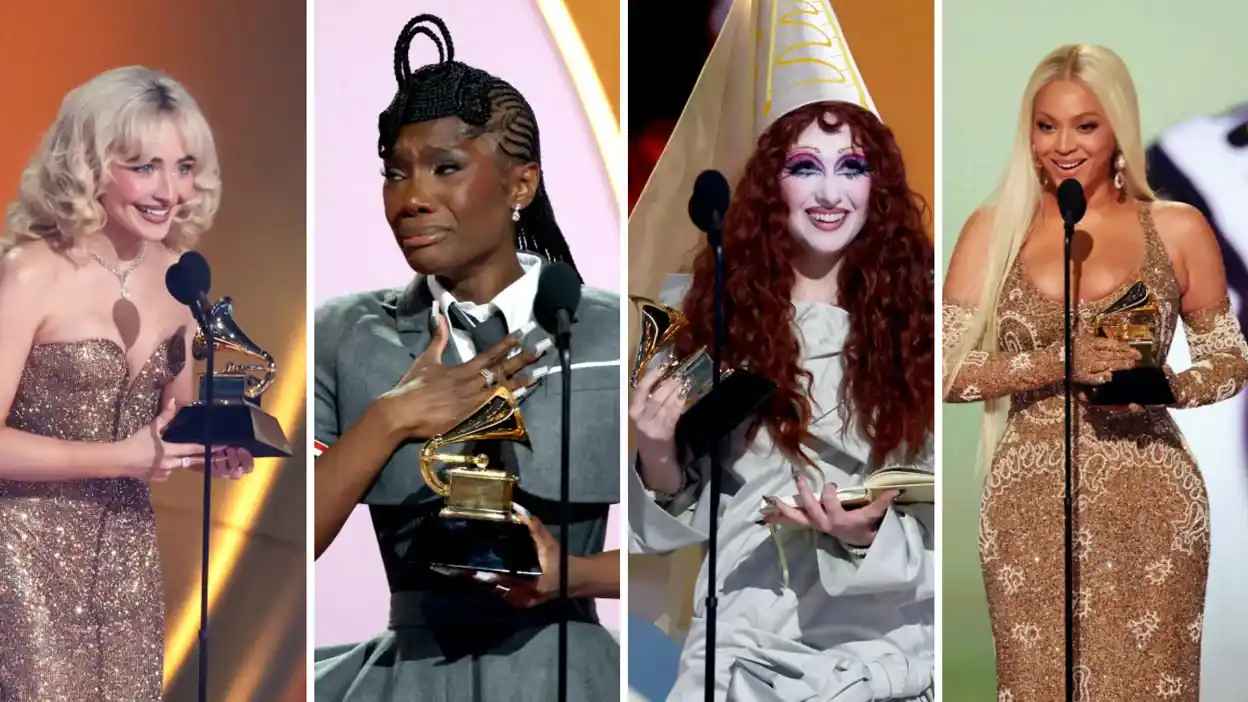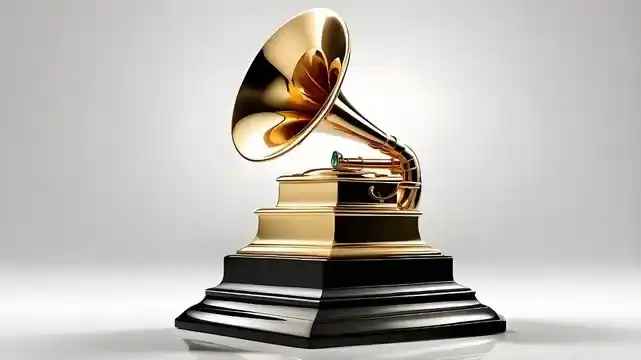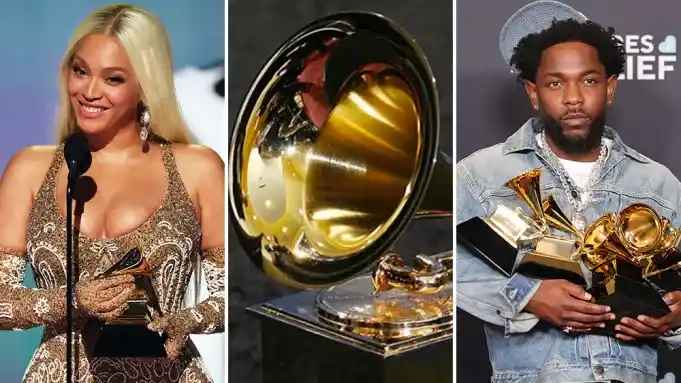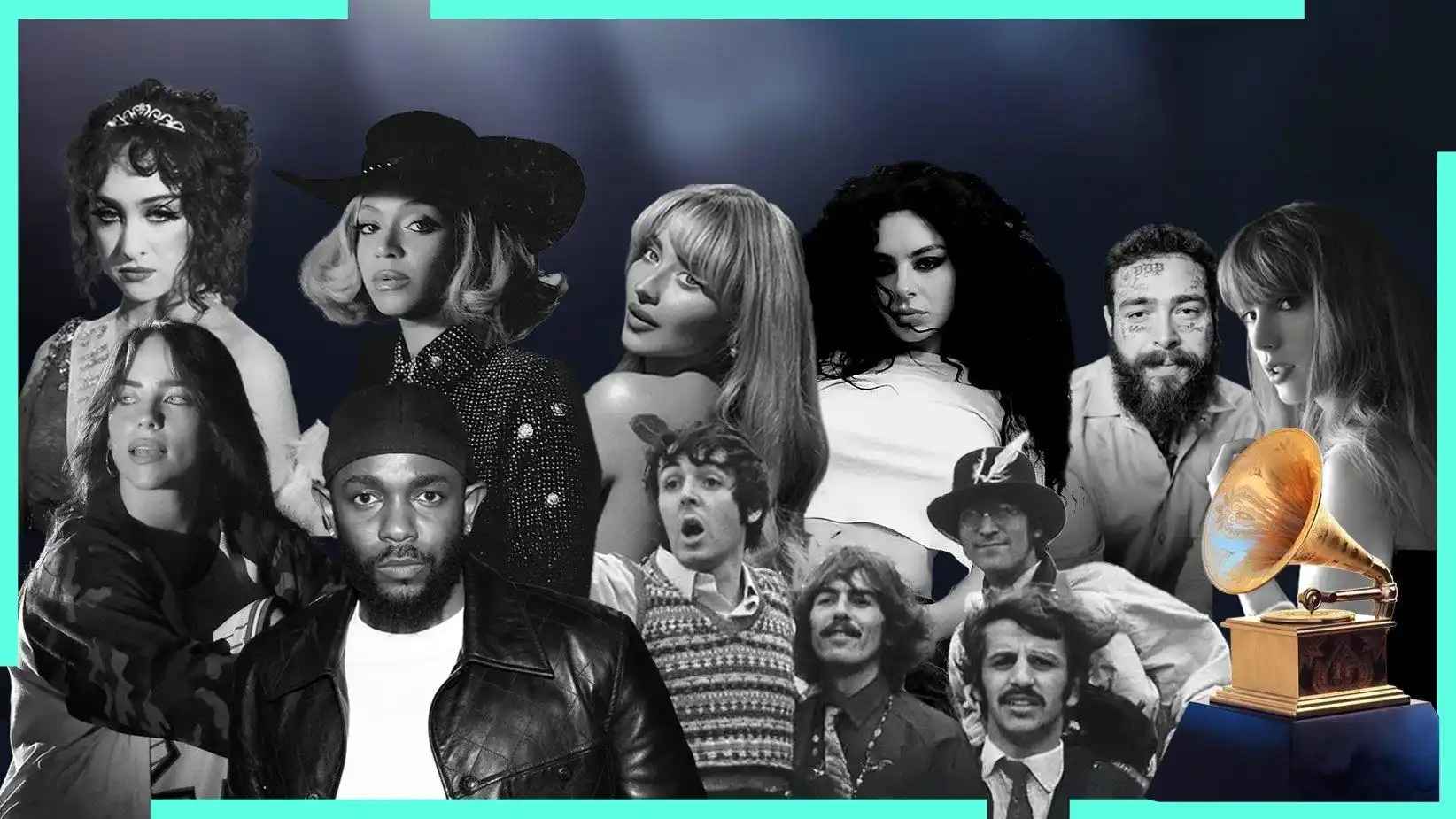2025 Grammy Awards: Winners, Highlights, and Key Moment
Updated on : 3 February, 2025

Image Source: google.com
Introduction
The Grammy Awards, presented annually by the National Academy of Recording Arts and Sciences (NARAS), are among the most prestigious accolades in the music industry. Established in 1959, the Grammys honor artistic and technical merit in the recording industry across various genres. With over 75 categories, including major awards like Album of the Year, Record of the Year, and Song of the Year, the Grammys celebrate the achievements of artists, producers, and songwriters alike.
The Evolution of Music's Biggest Night
The story behind music's most prestigious honor started with the Hollywood Walk of Fame project. The original plan to nominate artists for sidewalk stars in 1953 led music executives to realize they had nowhere near enough space for all deserving artists. This discovery sparked the creation of the National Academy of Recording Arts and Sciences, which later established the Grammy Awards.
The Beverly Hilton Hotel and New York's Park Sheraton Hotel hosted the first Grammy ceremony in 1959, recognizing winners in 28 categories. The awards moved between different cities like Nashville and Chicago before finding their permanent home at Los Angeles' Crypto.com Arena in 2008.

Image Source: google.com
| Decade | Artist | Achievement |
|---|---|---|
| 1960s | Frank Sinatra | First Album of the Year winner (Come Dance With Me) |
| 1980s | Michael Jackson | Record-breaking 8 wins in 1984 (Thriller) |
| 2000s | Beyoncé | Most Grammy wins by a female artist (32) |
| 2020s | Billie Eilish | Swept 'Big Four' categories in 2020 |
Popular Blogs
Key Milestones in Grammy History
The Recording Academy grew from its original 28 categories to today's 94 awards in a variety of genres. Beyoncé now reigns as the most decorated artist with 35 Grammy wins, breaking conductor Georg Solti's previous record of 31 victories. U2 leads all groups with 22 Grammy Awards.
The 2025 ceremony brought major changes to Grammy history. The Recording Academy joined forces with Disney in a groundbreaking ten-year broadcast deal that moved the show to ABC, Disney+, and Hulu. The 67th Grammy Awards showed its heart by becoming a fundraising platform for MusiCares Fire Relief to help those affected by the Los Angeles wildfires.
A powerful tribute to wildfire victims and first responders opened the ceremony, as stars came together to perform 'I Love LA'. The Weeknd's return to the Grammy stage after a three-year boycott proved the Academy's commitment to change. The Recording Academy's CEO pointed to important reforms that brought in 3,000 women voting members and built a voting body that is nearly 40% people of color.
The Grammy Awards keep evolving while remaining music's highest honor. The ceremony shows its lasting importance in today's music world by combining artistic excellence with social responsibility.
Winners of the 2025 Grammy Awards
The winners were announced during a star-studded ceremony:
- Album of the Year: Beyoncé – "Cowboy Carter"
- Record of the Year: Kendrick Lamar – "Not Like Us"
- Song of the Year: Billie Eilish – "What Was I Made For?"
- Best New Artist: Chappell Roan
Table: Complete List of Winners
| Category | Winner | Work |
|---|---|---|
| Album of the Year | Beyoncé | Cowboy Carter |
| Record of the Year | Kendrick Lamar | Not Like Us |
| Best Pop Vocal Album | Taylor Swift | Midnights |
| Best Rap Song | Drake | Slime You Out |
| Best Global Music Album | Burna Boy | I Told Them… |
| Producer of the Year | Jack Antonoff | Midnights, Hit Me Hard and Soft |
Date: February 3, 2025
Time: 11 AM IST
The 2025 Grammy Awards took place on February 2, 2025, at the Crypto.com Arena in Los Angeles, celebrating the best in music from the past year. Hosted by Trevor Noah for the fifth consecutive year, the ceremony featured stunning performances and honored outstanding artists across various genres.
Best Rap Album
- Winner: Alligator Bites Never Heal by Doechii
- Nominees:
- Might Delete Later by J. Cole
- The Auditorium, Vol. 1 by Common and Pete Rock
- Alligator Bites Never Heal by Doechii
- The Death Of Slim Shady (Coup De Grâce) by Eminem
- We Don't Trust You by Future and Metro Boomin
Best Pop Vocal Album
- Winner: **Short n' Sweet ** by Sabrina Carpenter
- Nominees:
- Short n' Sweet by Sabrina Carpenter
- eternal sunshine by Ariana Grande
- Chappell Roan: The Rise And Fall Of A Midwest Princess by Chappell Roan
- THE TORTURED POETS DEPARTMENT by Taylor Swift
Best Country Album
- Winner: COWBOY CARTER by Beyoncé
- Nominees:
- COWBOY CARTER by Beyoncé
- F-1 Trillion by Post Malone
- Deeper Well by Kacey Musgraves
- Higher by Chris Stapleton
- Whirlwind by Lainey Wilson
Best New Artist
- Winner: Chappell Roan
- Nominees:
-
Benson Boone
-
Sabrina Carpenter
-
Doechii
-
Khruangbin
-
Raye
-
Chappell Roan
-
Shaboozey
-
Teddy Swims
-
Best Latin Pop Album
-
Winner: GARCÍA by Kany García
-
Nominees:
- Funk Generation by Anitta
- El Viaje by Luis Fonsi
- Las Mujeres Ya No Lloran by Shakira
- ORQUÍDEAS by Kali Uchis
Best Pop Duo/Group Performance
- Winner: "Die With A Smile" by Lady Gaga and Bruno Mars
- Nominees:
- LEVII'S JEANS" by Beyoncé featuring Post Malone
- Guess" by Charli xcx and Billie Eilish
- the boy is mine" by Ariana Grande, Brandy, and Monica
- Die With A Smile" by Lady Gaga and Bruno Mars
Record of the Year
- Winner: "Not Like Us" by Kendrick Lamar
- Nominees:
- "TEXAS HOLD 'EM" by Beyoncé
- "Espresso" by Sabrina Carpenter
- "360" by Charli xcx
- "BIRDS OF A FEATHER" by Billie Eilish
- "Not Like Us" by Kendrick Lamar
- "Good Luck, Babe!" by Chappell Roan
- "Fortnight" by Taylor Swift featuring Post Malone
Song of the Year
- Winner: "Not Like Us" by Kendrick Lamar (songwriter Kendrick Lamar)
- Nominees:
- "A Bar Song (Tipsy)" by Shaboozey (songwriters: Sean Cook, Jerrel Jones, Joe Kent, Chibueze Collins Obinna, Nevin Sastry, Mark Williams)
- "Die With A Smile" by Lady Gaga and Bruno Mars (songwriters: Dernst Emile II, James Fauntleroy, Lady Gaga, Bruno Mars, Andrew Watt)
- "Fortnight" by Taylor Swift featuring Post Malone (songwriters: Jack Antonoff, Austin Post, Taylor Swift)
- "Good Luck, Babe!" by Chappell Roan (songwriters: Kayleigh Rose Amstutz, Daniel Nigro, Justin Tranter)
- "Not Like Us" by Kendrick Lamar (songwriter: Kendrick Lamar)
- "Please Please Please" by Sabrina Carpenter (songwriters: Amy Allen, Jack Antonoff, Sabrina Carpenter)
- "TEXAS HOLD 'EM" by Beyoncé (songwriters: Brian Bates, Atia Boggs, Beyoncé, Elizabeth Lowell Boland, Megan Bülow, Nate Ferraro, Raphael Saadiq)
Album of the Year
- Winner: COWBOY CARTER by Beyoncé
- Nominees:
- New Blue Sun by André 3000
- Short n' Sweet by Sabrina Carpenter
- BRAT by Charli xcx
- Djesse Vol. 4 by Jacob Collier
- HIT ME HARD AND SOFT by Billie Eilish
- Chappell Roan: The Rise And Fall Of A Midwest Princess
- THE TORTURED POETS DEPARTMENT by Taylor Swift
Performances at the 2025 Ceremony
The ceremony featured live performances from various artists including:
- Billie Eilish
- Sabrina Carpenter
- Charli XCX
- Other surprise guests who paid tribute to influential figures in music.
Inside the Grammy Selection Process
The Grammy Awards might look glamorous on TV, but a detailed selection process determines who wins the golden gramophone. Approximately 11,000 voting members of the Recording Academy coordinate this complex trip from entry to victory.
How Winners Are Really Chosen
Artists and record companies begin their journey by submitting entries during the eligibility period from September 16, 2023, to August 30, 2024. These entries go through careful screening to meet specific qualifications. The voting happens in two steps: First Round Voting picks nominees, and Final Round Voting selects winners in all 94 categories.
Members can vote in up to ten categories across three genre fields and the six General Field categories during First Round Voting. Deloitte, an independent accounting firm, collects and counts the ballots to keep the process honest.

Image Source: google.com
Voting Stages
- Entry Submission: Artists/labels submit work for consideration.
- Screening: Over 350 experts review entries for eligibility.
- Nominations: Members vote in their expertise areas (e.g., producers in technical categories).
- Final Voting: All members vote across general field categories.
Controversy: Allegations of bias persist. In 2023, 67% of nominees were male, sparking calls for quota reforms.
The Role of Industry Experts
More than 350 experts from the industry review submissions to make sure recordings meet qualifications. They place them in the right categories. These specialists assess entries in music of all types. They look at technical criteria instead of making artistic judgments.
Peer recognition stands at the heart of the Recording Academy's process. Members vote only in their areas of expertise. Jazz musicians vote on jazz categories, while producers focus on production excellence. Active participation in both voting rounds is vital for members in good standing. This helps ensure fair assessment based on artistic and technical merit.
Changes in Voting Procedures for 2025
The 2025 Grammy Awards brought the most important updates to stay fair and relevant. The Recording Academy made changes to eligibility criteria, category names, and submission guidelines. Final Round Voting for the 2025 ceremony happened from December 12, 2024, through January 3, 2025.
Recording Academy CEO Harvey Mason Jr. highlighted the vital role voting members play in shaping music's future. The "Grammy Effect" remains a revolutionary force in the industry, giving winners major career boosts. This peer-reviewed system will give a true reflection of artistic excellence rather than just commercial success.
Grammy Awards 2025: A Year of Change
The 67th Grammy Awards became a night that revolutionized music history and social awareness. The ceremony made history by becoming a fundraiser to help wildfire victims in Los Angeles.
Record-Breaking Moments
Beyoncé wrote her name in history books as the first Black woman to win Best Country Album for "Cowboy Carter". Her heartfelt acceptance speech tackled genre barriers head-on. "I think sometimes genre is used as a code word to keep artists in a specific place," she said. She walked into the night as the most-nominated artist with 11 nods.
Notable Winners and Performances
Kendrick Lamar owned the ceremony with five awards, including Record of the Year and Song of the Year for "Not Like Us". His acceptance speech centered on Los Angeles, and he dedicated his wins to the city battling wildfires.
Lady Gaga and Bruno Mars touched hearts with their moving rendition of "California Dreamin'" that honored wildfire victims. The Weeknd made his dramatic comeback to the Grammy stage after boycotting for three years. This return showed the Academy's steadfast dedication to change.
Industry Response
Chappell Roan's Best New Artist acceptance speech ignited conversations about artist compensation across the industry. She challenged directly: "Labels need to treat their artists as valuable employees... labels, we've got us, but do you got us?". The night celebrated more breakthrough moments with Sabrina Carpenter winning her first Grammy for Best Pop Solo Performance with "Espresso". Doechii claimed victory in the Best Rap Album category for "Alligator Bites Never Heal".
The ceremony's new format helped raise funds for wildfire relief efforts successfully. This showed how the music industry comes together for social causes effectively. Recording Academy CEO Harvey Mason Jr. spoke about the most important reforms, highlighting the organization's push toward transparency and change.
Beyond the Golden Gramophone
The golden gramophone trophy symbolizes more than artistic recognition—it holds substantial economic power in the music industry. A newer study, published by Oxford Economics showed the live music industry generated a total fiscal effect of INR 1476.66 billion in 2019.
Economic Impact on Music Industry
Grammy awards create major financial waves throughout the music sector. The industry's nationwide economic effect reached INR 11188.85 billion in 2019. This supported 913,000 jobs with labor income of approximately INR 3560.86 billion. The live events sector produced a direct effect of INR 4657.80 billion, which included venue operations and attendee spending.

Image Source: google.com
Marketing Power of Grammy Recognition
The "Grammy Effect" serves as a powerful catalyst for artist success. Samara Joy's Best New Artist win at the 2023 ceremony resulted in a remarkable 989% boost in sales and a 670% increase in streaming numbers. H.E.R.'s Song of the Year victory sparked an astounding 6,771% surge in single-day sales.
Best New Artist winners have managed to keep their commercial momentum strong. Billie Eilish sold 2 million equivalent album units, and Olivia Rodrigo achieved 2.1 million units. Jon Batiste's album sales jumped by more than 2,700% after his Grammy victories.
Industry Relationships
The Recording Academy's influence goes beyond awards and shapes vital industry connections. The Latin GRAMMY Policy Briefings encourage discussions between policymakers and creators. The National Advocacy Committee works with the Recording Academy's team to advance legislative priorities that protect music creators' rights.
Grammy recognition gives artists increased negotiating power with record labels. Winners often connect with more influential managers and secure lucrative recording deals. This improved industry position lets winners experiment with new styles while keeping creative control over their work.
Impact on Artist Careers
A Yale study analyzing six decades of Grammy data shows that winning a golden gramophone changes an artist's creative path completely.
Statistical Analysis of Post-Grammy Success
The numbers tell an interesting story. Grammy winners climb 22 positions higher on Billboard charts. We found that winning artists see their albums rise 27 spots above non-winning nominees. Success goes beyond charts - winners get 50% more production resources, which lets them take on bigger projects.
Career-Changing Grammy Moments
Grammy recognition opens unexpected creative doors. Winners often explore new artistic territories, while non-winners stick to mainstream styles. Jody Watley's story shows this perfectly - after winning Best New Artist, she switched from R&B to rock/pop and house music. Charlie Byrd took a different path; after his 1962 nomination, he stayed true to his Brazilian jazz roots.
The 'Grammy Boost' Effect
Grammy success hits differently for each artist. Independent label artists show 29% more style changes compared to major label artists because winners can negotiate better deals with record companies.
Money talks too; right after the 2020 ceremony, category winners saw their album sales jump by 153%. Songs they performed at the show did even better, with sales shooting up by 384%. The rewards last longer than just sales spikes - winners get better chances to work with other artists and build their name worldwide.
Past success plays a big role; artists who ranked lower on Billboard charts before winning showed bigger creative changes than chart-toppers—this shows that up-and-coming artists get the biggest boost from Grammy recognition.

Image Source: google.com
Cultural Significance in 2025
The 2025 Grammy Awards exceeded traditional entertainment boundaries shaped cultural conversations; Recording Academy showed its steadfast dedication social responsibility through unprecedented initiatives artist advocacy.
Reflecting Social Movements
The 67th Grammy Awards became a powerful fundraising platform for wildfire relief efforts in Southern California. The ceremony raised INR 590.66 million to support Los Angeles wildfire victims. Recording Academy CEO Harvey Mason Jr. stressed the importance of using their platform to raise both money and awareness.
Platform for Artist Expression
The ceremony gave voice diverse perspectives critical social dialogs; Chappell Roan’s Best New Artist acceptance speech sparked significant conversations about artist compensation industry reform; Lady Gaga employed platform champion transgender visibility LGBTQ+ rights declaration “trans people deserve love”.
Beyoncé’s groundbreaking win Best Country Album “Cowboy Carter” challenged genre barriers industry segregation; she addressed how genre often acts code word maintain artistic boundaries acceptance speech; Kendrick Lamar’s victories reinforced rap music’s cultural significance proclaimed “Nothing is more powerful than rap music; we are culture”.
Global Cultural Impact
Recording Academy’s progress mirrors increasingly interconnected world; “World Music” category transformation “Global Music” marks departure colonial connotations—this change recognizes that music culture has no borders promotes state-of-the-art fusion sounds.
These awards now act catalyst meaningful cultural dialog; ceremony showed how music shapes collective future breaking down barriers uniting people—this platform helps artists craft stories inspire generations through authentic self-expression cultural representation.
Digital Age Transformation
Digital platforms have transformed how audiences connect with music’s biggest night; The Grammys reached 62.6 billions record-breaking social media impressions last year marking exceptional digital milestone history ceremonies’ history.
Streaming’s Influence on Grammy Recognition
Modern music consumption relies heavily on streaming platforms. Nielsen reports a 76% increase in streaming usage compared to last year. This fundamental change led Billboard to use "album equivalent units" for chart rankings. The new system counts 1,500 streams as one album sale. The 2024 ceremony saw a 173% surge in Paramount+ streaming numbers. These numbers show the growing strength of digital audiences.
Social Media’s Role In Awards
Recording Academy uses multiple platforms boost engagement—their strategy includes:
- Live-streaming three days pre-ceremony content
- Immediate social media updates exclusive backstage access
- Interactive fan experiences dedicated platforms
The Academy's digital marketing team creates authentic content that matches each platform's unique features. They develop different content strategies for Twitter, Instagram, and Facebook. This approach recognizes how users behave differently on each platform.
Virtual Grammy Experiences
The Recording Academy has stepped into innovative digital spaces. They partnered with Roblox and Mastercard to create their first official virtual GRAMMY Week experience. Artists like Glass Animals and Walker Hayes participated in virtual meet-and-greets during this groundbreaking initiative.
The Academy works together with IBM to improve digital experiences through AI-powered content creation. This partnership created "AI Stories with IBM watsonx™." Recording Academy editors can now maintain steady content flow during busy moments. The platform's AI Content Builder dashboard has made the ticketing system 80% more efficient.
Future of the Grammy Awards
The Recording Academy has set bold plans for the Grammy Awards that blend tradition with state-of-the-art approaches. The organization has committed over INR 337.52 million to help music professionals affected by Los Angeles wildfires.
Upcoming Changes and Innovations
The Recording Academy has reimagined its approach to music recognition. The 2025 ceremony brought major category changes. The Best Dance/Electronic Music Album became Best Dance/Electronic Album. The Best Pop Dance Recording category evolved into Best Dance Pop Recording to match current sub-genres.
Addressing Industry Challenges
The Academy has taken steps to solve key issues in the music community. We focused on AI-related concerns through new guidelines. While AI-generated elements qualify, human creators must make "meaningful and more than de minimis" contributions. The Academy maintains artistic integrity by accepting submissions only from human creators.
Vision for Next Decade
Harvey Mason Jr., the Recording Academy's CEO, highlights the vital role voting members play in shaping music's future. The organization demonstrates its dedication to progress through:
- More diverse voices in voting membership
- Greater support for music professionals during crises
- Mutually beneficial alliances for digital advancement
The Academy continues its mission to enable creators and foster innovation. Grammy voters bear the responsibility to select nominees who reshape today's music industry.
Conclusion
The Grammy Awards remain music's most prestigious honor. Their rise from a simple recognition ceremony to a powerful platform for social change shows remarkable adaptability. These awards continue to prove their relevance today.
My experience with these awards reveals their influence reaches way beyond the reach and influence of the ceremony itself. The Recording Academy's mutually beneficial alliances with Disney+, ABC, and Hulu help Grammy recognition reach wider audiences while they retain control of artistic integrity. The Academy's steadfast dedication to diversity becomes evident through expanded voting membership and reformed selection processes.
Grammy recognition changes careers dramatically. Chappell Roan and Kendrick Lamar's 2025 wins serve as perfect examples. Their victories sparked crucial discussions about artist compensation and social responsibility. These golden gramophones mean more than just trophies—they represent peer recognition, industry validation, and cultural significance.
The Recording Academy's work in social causes, particularly their wildfire relief efforts, demonstrates music's power to create positive change. Their acceptance of new ideas in streaming platforms and digital innovation will give Grammy relevance to future generations.
Grammy Awards hold more importance now than ever before. They bring artists together, celebrate excellence, and shape music's future while staying true to their core mission—recognizing outstanding artistic achievement. This balance between tradition and innovation ensures their lasting significance in our changing musical world.



















